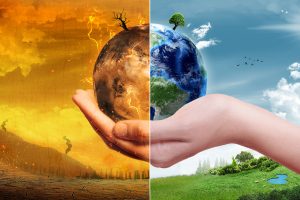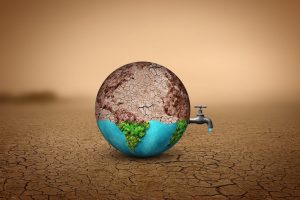
Reem Shraiky, UK
Islam gives guidance on all social, economic, political, cultural, and other substantial issues of life. Although climate change and environmental issues are contemporary, Islam has been tackling them before they became such a grave threat to our planet that they are now. Islam has been giving us guidance on such matters from more than 1400 years ago.
It is evident from Ahadith [sayings of the Holy Prophet (sa)] that Muslims have a religious duty to safeguard the world’s natural environment. For instance, the Holy Prophet (sa) said: ‘The world is sweet and green, and verily Allah has appointed you as a representative and trustee over it’. [1]
Prohibition of Wastage
In line with this teaching, Islam has prohibited the wastage of all-natural resources and their excessive consumption. We see today that water scarcity and food shortages have become major problems due to our exploitative use of our planet’s precious resources.
But Allah the Almighty states in the Holy Qur’an:
‘…eat and drink but exceed not the bounds; surely, He does not love those who exceed the bounds.’ [2]
Allah also instructs us to not focus on extravagance and to share the benefit of everything that He has bestowed upon man:
‘And He it is Who brings into being gardens, trellised and untrellised, and the date-palm and cornfields whose fruits are of diverse kinds, and the olive and the pomegranate, alike and unalike. Eat of the fruit of each, when it bears fruit, but pay His due on the day of harvest and exceed not the bounds. Surely, Allah loves not those who exceed the bounds.’ [3]
In this regard the Holy Prophet (sa) set a golden rule, he said:
‘Don’t waste water even if you were by a running river’. [4]
This is because water is the origin of life, as the Holy Qur’an says: ‘And We made from water every living thing.’ [5]

Encouraged to Cultivate Land
Furthermore, the world has come to realise the importance of cultivating our planet and reforestation. Efforts are being made to protect the earth from the disaster of desertification which causes billions of dollars’ worth of damage every year. In addition, this calamity is contributing to health, social, and political problems due to the displacement of large numbers of people.
However, Prophet Muhammad (sa) understood the significance of trees in protecting the environment from climate change thousands of years ago. He always forbade his companions from destroying trees and laid great emphasis upon planting more of them.
The Holy Prophet (sa) said: ‘There is none amongst you who plants a tree or sows seeds, and then a bird, or a person or an animal eats from it, but that would be taken as an act of charity for him.’ [6]
He also said, ‘Anyone who plants a tree and waits patiently for it till it bears fruits, that will be on his behalf an act of a charity whenever anything benefits from this tree.’ [7]
The Holy Prophet (sa) also stated: ‘If the last day comes and any of you has a palm shoot in his hand then let him plant it first.’ [8]

He also asserted: ‘He who has a land, should cultivate it, if he can’t cultivate it or finds himself incapable to do so, he should lend it to his brother in faith, and he should not take a rent from him’ [9]
The first Caliph of Islam, Hazrat Abu Bakr (ra), told the General of the Muslim army ‘Do not cut down a palm tree or a blossoming tree, do not destroy a building, and do not kill a sheep or camel, except for the purpose of eating it.’ [10]
Cleanliness of Body and Environment
Islam also focuses on cleanliness and considers it half of faith.
It made ablution a condition for valid worship; likewise, purifying the place in which we perform our worship, and the cleanliness of our attire are integral components to Islamic worship.
The Holy Prophet (sa) explained that we must clean our teeth frequently in the day, as well as wash our hands and mouth before and after eating, upon waking up, and after using the toilet.
However, cleanliness in Islam is not limited to the body and the house, rather, Muslims are commanded to clean the path for others and to remove any items which may cause someone pain or injury. By ensuring this, the environment also remains clean.
The Holy Prophet of Islam (sa) said: ‘Removing harmful things from the road is an act of charity.’ [11]
He also said: ‘The deeds of my people, good and bad, were presented before me; I found the removal of harmful objects from the road among their good deeds, and phlegm which might be left in a mosque unburied among their evil deeds’ [12]. It is worth explaining that Mosques at that time were untiled and that they continue today to be the places of the largest gatherings for Muslims. Thus, from this statement of the Holy Prophet (sa), we learn not to spit on the streets or elsewhere. If a person has no other choice, then they must bury it, as not only is it disgusting but it can cause a lot of diseases.
Moreover, the value Muslims hold for the environment and its safety is evident in an incident where a man once asked the Holy Prophet (sa): ‘O Prophet of Allah, show me an action by which I will enter heaven?’ The Holy Prophet (sa) said, ‘Remove harm out of the people’s path.’ [13]
He also related: ‘There was a branch of a tree that annoyed the people. A man removed it, so he was admitted to Paradise.’ [14]
The Holy Prophet’s (sa) care for the cleanliness of the environment even extended to situations where individuals needed to relieve themselves. Although we must take into account that there were no conventional toilets in that era, still his instructions are valid today. He said:
‘Keep away from three things which provoke cursing: relieving yourselves in a watering place, on the passageways and in the shaded places.’ [15]
The Holy Prophet (sa) also advised Muslims not to pollute any water sources, forbidding them from urinating in stagnant water. [16] No doubt, urinating in stagnant water will not just pollute it but it will turn it into a swamp that spreads diseases and illnesses.
Our Duty to Look After Earth
Moreover, according to Islam, humans are entrusted to look after the earth. It is our duty to repair and protect it, as the Holy Qur’an says:
‘Verily, We have made all that is on the earth as an ornament for it, that We may try them as to which of them is best in conduct.’ [17]
Similarly, once the second Caliph of Islam, Hazrat Umar (ra), asked an old man: ‘Why don’t you cultivate your land?’
He replied: ‘I am an old man who might die tomorrow.’ Hazrat Umar (ra) entreated him to cultivate it and even helped him in this effort with his own hands. [18]
Furthermore, the Holy Prophet (sa) encouraged the restoration of wastelands, saying: ‘He who revives a dead land will be rewarded, and [when] any creature eats of it, this will be counted as an act of charity for him.’ [19]
And in Islam, if someone revives a barren land, he will become its owner [20]. Of course, this was to encourage such an act.
Protect Food from Contamination
The Holy Prophet (sa) also ordered us to protect our food from contamination and encouraged energy conservation. He said, ‘Turn off the lamps if you want to lie down. Close your doors, tie the mouths of your water skins, and cover the food and drink.’ [21]
The Holy Prophet (sa) forbade us from blowing in any food containers. [22] This is clearly to protect the food from any contamination or microbes.

Ponder Over Allah’s Creation and Blessings
Furthermore, the Holy Qur’an instructed us to think and ponder over many things, including how the rain pours down, the plants sprout and the natural harmony of all living things. Not only does this serve to prove the existence of God and the splendour of His creation, but it also implies the importance of preserving these blessings:
‘Now let man look at his food: How We pour down water in abundance, Then We cleave the earth — a proper cleaving — Then We cause to grow therein grain, And grapes and vegetables, And the olive and the date-palm. And walled gardens thickly planted, And fruits and herbage, Provision for you and your cattle.’ [23]
‘And We send impregnating winds, then We send down water from the clouds, then We give it to you to drink; and you are not the ones to store it up.’ [24]
This verse calls us to ponder over the role of the wind in initiating growth and constructing life by pollinating the plants, then it speaks about the importance of rain. And due to the importance of rain, Muslims are instructed to pray Salatul istisqaa’ (the prayer asking for rain) seeking rain from Allah.
In another verse, Allah says: ‘And Allah it is Who sends the winds which raise the clouds; then do We drive them to a lifeless tract of land, and quicken thereby the earth after its death.’ [25]
In fact, the Holy Qur’an frequently urges us to contemplate the universe, to recognise the grandeur of the Creator and to both appreciate and care for his creation.
Rights of Animals

His Holiness, Hazrat Mirza Masroor Ahmad (aba), lovingly feeding birds during his trip to Melbourne, Australia
Islam also commands us to be merciful towards and to protect animals and birds.
The Holy Prophet (sa) said, ‘He who kills a bird for fun will find this bird approaching him on Judgment Day saying, ‘My Lord, this man killed me for fun and not for any benefit.’’ [26]
He (sa) further commanded Muslims to be gentle to animals, saying:
‘Beware of ever using the backs of your rides as pulpits! Allah has subjugated them for you so that they can carry you from one place to another which you cannot reach without difficulty.’ [27].
The Holy Prophet (sa) stressed the rights of animal mothers as well, with a companion of the Holy Prophet (sa) narrating: ‘we were on a journey with God’s Messenger and he had gone to do something. During that moment we saw a bird with her two nestlings which we took. The bird became agitated spreading out its wings. Then when the Prophet came back, he said, ‘Who has grieved this bird by taking its young ones? Give them back to her immediately.’’ [28]
The Messenger of Allah (sa) further said:
‘There is no person, who kills a small bird or anything larger for no just reason, who will not be asked by Allah about it.’ [29]
Recycling
Moreover, the Holy Prophet (sa) also encouraged recycling and instructed us to utilise and benefit from whatever materials we have. Once a sheep died so the Messenger of Allah (sa) said to its owners: ‘Why don’t you remove its skin, then tan it so you can have something useful from it.’ [30]
Importance of Walking
Without a doubt, walking is one of the most important pieces of advice that has been given to us to preserve the environment and human health alike. Islam urges Muslims to walk to the mosque even if their homes are far away. Indeed, the mosque is the most frequent place a Muslim visits during the day, so he is advised to walk to it, and for this, he is promised a reward. The Holy Prophet (sa) stated: ‘There is for every step (towards the mosque) a degree (of reward) for you’. [31]
The tribe of Banu Salimah wanted to move nearer to the mosque. On learning this, the Holy Prophet (sa) said to them, ‘I heard that you intend to move near the mosque’. They said, ‘yes, O Messenger of Allah, we do want to do that’. He said, ‘O Banu Salimah, keep to your homes, your steps [to the mosque] are recorded’. [32]

Guidance on Climate Change
Recently, the Fifth Caliph and World Head of the Ahmadiyya Muslim Community, His Holiness, Hazrat Mirza Masroor Ahmad (aba), insightfully responded to a question on climate change and how to tackle it. This was during a virtual online meeting held with Indonesia’s Waqfe-Nau (Life devotees) in January 2021:
‘Climate change is a problem everywhere, all across the world. Especially in the third world countries where the population is increasing disproportionately. Just to accommodate the increased population, nations are developing new residential areas and because of this, forests are being cut and this deforestation is a major cause of climate change. So, you have to be very particular that whenever one tree is cut, two trees should be planted in return. Fuel consumption should also be reduced. Now people have become so lazy that if they want to go from one place to the other place and the distance is only 100 yards or 200 yards, instead of walking to the place they use their motorbike or car. In this way, pollution is increasing. There are so many other factors which are also causing pollution and climate change. So, we have to be very careful. Although, we cannot say that because of the fear of climate change we should not have children.’
This guidance, therefore, sheds light on the ways we can adapt our behaviours to preserve our planet’s natural habitats and resources.
Makkah: A Model Sustainable City
The Holy Prophet (sa) established in Makkah what can be considered today a conservation project whereby plants, animals and living species are protected. He said:
‘Until the Day of Judgement, its [the earth’s] green grass is not to be uprooted, its trees are not to be cut and its game not to be hunted.’ [33]
The Holy Prophet (sa) also strongly discouraged killing any insect or animal unless it were about to harm the human. Likewise, he forbade the killing of four kinds of animals in any circumstances: Ants, bees, hoopoes, and shrikes. [34]
Of course, it is not surprising that it is forbidden in Islam to kill bees; the importance of honey is elucidated in the Holy Qur’an when it states, ‘Therein is cure for men’. In addition, bees are responsible for 70% of the world’s food, that is why Allah has singled out a whole chapter in the Holy Qur’an – An-Nahl – in which He mentions bees and their benefits:
‘And thy Lord has inspired the bee, saying, ‘Make thou houses in the hills and in the trees and in the trellises which they build. ‘Then eat of every kind of fruit, and follow the ways of thy Lord that have been made easy for thee.’ There comes forth from their bellies a drink of varying hues. Therein is cure for men. Surely, in that is a Sign for a people who reflect.’ [35]

Guidance on Plague Outbreak
Finally, I would like to end with guiding words from the Holy Prophet (sa) which are particularly of utmost relevance and importance to us today. The Holy Prophet (sa) said: ‘If you hear of an outbreak of plague in a land, do not enter it; but if the plague breaks out in a place while you are in it, do not leave that place.’ [36] He also said, ‘Do not graze a sick herd with a healthy one.’ [37] Similarly, a sick patient should not be with a healthy person in the same place.
Conclusion
The comprehensive teachings and guidance of Islam are sufficient to save mankind from all its environmental problems and to safeguard the magnificent treasure trove we have been bestowed.
ENDNOTES
[1] Muslim
[2] The Holy Qur’an 7:32
[3] The Holy Qur’an 6:142
[4] Mishkat al-Masabih
[5] The Holy Qur’an: 21:31
[6] Bukhari
[7] Musnad Ahmad
[8] Ibid
[9] Muslim
[10] Kanzul Ummal
[11] Al-Adab Al-Mufrad
[12] Muslim
[13] Al-Adab Al-Mufrad
[14] Sunan Ibn Majah
[15] Sunan Abi Dawud
[16] Muslim
[17] Holy Qur’an 18:8
[18] Ibn Jarir
[19] An-Nasa’i
[20] Abu Dawood
[21] Bukhari
[22] Abu Dawood
[23] The Holy Qur’an: 80:25-33
[24] The Holy Qur’an 15:23
[25] The Holy Qur’an 35:10
[26] Musnad Ahmad
[27] Abu Dawood
[28] Ibid
[29] Sunan an-Nasa’i
[30] Jami` at-Tirmidhi
[31] Muslim
[32] Ibid.
[33] Sunan an-Nasa’i
[34] Sunan Ibn Majah
[35] The Holy Quran 16:69-70
[36] Bukhari
[37] Ibid




Add Comment